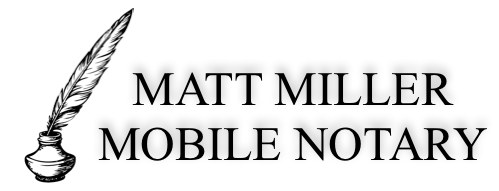Getting your documents Notarized isn’t always easy in the most normal of times but now with a global pandemic and rolling shelter in place orders, you might think it’s impossible. With businesses closed, offices working from home, and shortened hours at the local bank branch, obtaining notary services is a new challenge. Enter the Mobile Notary.
Mobile Notaries are available in most every city today. They are a traveling Notary Public who travels to their clients upon request. Typically you call, email, or book an appointment on the notary’s website and the mobile notary shows up at your location at a time that is convenient for you. A mobile notary goes anywhere from one to ten places per day to notarize a single signature on a single document, or notarize multiple signatures on multiple documents, and provide other services such as fingerprinting at any particular stop. In the era of social distancing, mobile notaries are meeting customers in their garages, patios, porches, curbside, even in public parks and other outdoor spaces to help keep everyone safe.
Mobile Notaries not only offer traditional notarization services but also a wide range of other helpful services. Most mobile notaries can print documents before your appointment and deliver them, ship documents onto their final destination, obtain Apostille Services for documents going overseas, provide fingerprinting services, and much, much more. In some states, a Notary Public can even come to your home and officiate a marriage.
To find a mobile notary in your area, simply do a web search for “mobile notary” and your city and state names. Tell the notary that you choose what kinds of documents you need notarized and if there are any other services such as those listed above that the notary can perform for you. Mobile notaries typically charge a state-mandated fee for each signature notarized and a travel fee to cover the costs of getting to you. Some notaries even offer a discount or a package rate when you have multiple documents being notarized.
Whether you are sheltering in place, working from home, or simply need something notarized and don’t want to drive to the local copy shop, call your local mobile notary and get the services you need to your door.
A Notary Public is an official of integrity appointed by state government —typically by the secretary of state — to serve the public as an impartial witness in performing a variety of official fraud-deterrent acts related to the signing of important documents. These official acts are called notarizations, or notarial acts. Notaries are publicly commissioned as “ministerial” officials, meaning that they are expected to follow written rules without the exercise of significant personal discretion, as would otherwise be the case with a “judicial” official.
A Notary's duty is to screen the signers of important documents — such as property deeds, wills, and powers of attorney — for their true identity, their willingness to sign without duress or intimidation, and their awareness of the contents of the document or transaction. Some notarizations also require the Notary to put the signer under an oath, declaring under penalty of perjury that the information contained in a document is true and correct.
Impartiality is the foundation of the Notary's public trust. They are duty-bound not to act in situations where they have a personal interest. The public trusts that the Notary’s screening tasks have not been corrupted by self-interest. And impartiality dictates that a Notary never refuses to serve a person due to race, nationality, religion, politics, sexual orientation or status as a non-customer.
As official representatives of the state, Notaries Public certify the proper execution of many of the life-changing documents of private citizens — whether those diverse transactions convey real estate, grant powers of attorney, establish a prenuptial agreement, or perform the multitude of other activities that enable our civil society to function.
To find a notary in your area, do an internet search for “notary public” and the names of your city and state.



